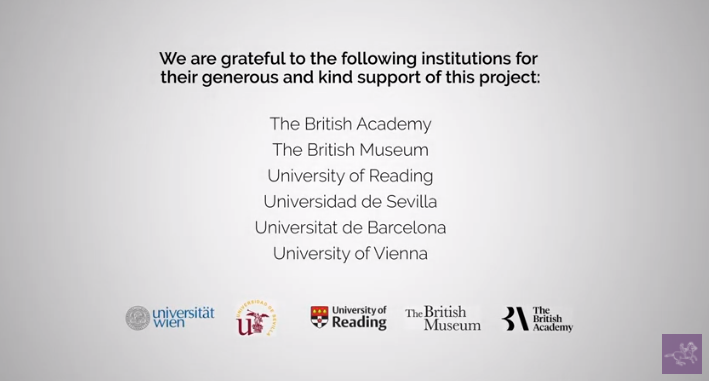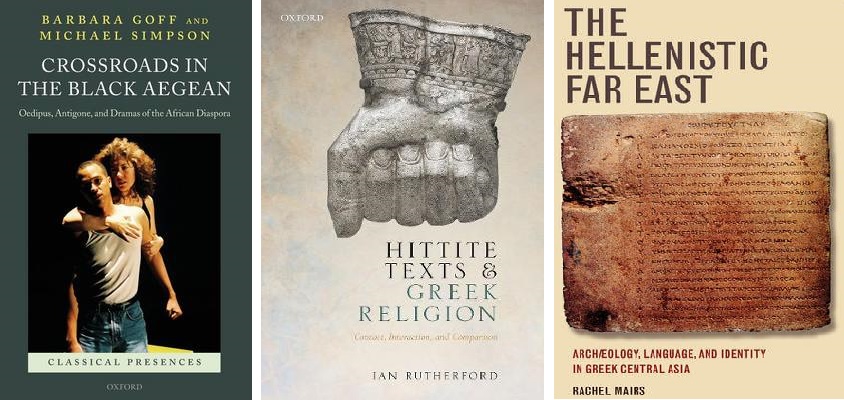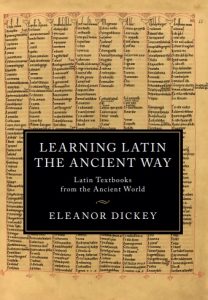
Interviewee: Ms. Roberta Dainotto. Interviewer: Bunny Waring.
Date: 16th July 2021
Welcome to the Classic Department’s series What’s it Like? During these episodes staff, volunteers and students who specialise in all fields of Classics, Archaeology and Museums, will share with you the realities of their jobs. What to be a Linguist? Museum Curator? Archaeologist? Lecturer? Well Travelled Researcher? A Barrier-Breaker? Have No Idea? Then read on!
This week: Ms. Roberta Dainotto.
A PhD Researcher Specialising in Ancient Greek Philology.
 Name: Ms. Roberta Dainotto
Name: Ms. Roberta Dainotto
Area of Specialism: Classics.
Topics of Interest: Ancient Greek Rhetoric.
Job Title: PhD student in Classics, specializing in ancient Greek Philology.
Job Responsibilities: I am finalising my PhD studies and this is my current -and only- occupation! This means that I am trying to finally put together a few years in what I wish it will be a good output (fingers crossed). In the meantime, I am also trying to face new challenges and open up new possibilities, since doing just one assignment for months is quite weary some days. Moreover, I aim to prepare the ground for my future steps. Recently, I have succeeded in a selection to a pre-doctoral fellowship at the Harvard University’s Centre of Hellenic Studies (CHS), which will allow me to work simultaneously on a new project for the next year. I am extremely glad of this appointment which will allow me to approach a different subject under the supervision of a new team of professors – a priceless opportunity to consolidate my field of study.
Introduction
 I am a PhD candidate in the Department of Classics at the University of Crete. I have earned BA and MA degrees in Classics at the University of Catania, which is where I come from. I decided to move to another country because I wanted to approach my subject of study from a different perspective, to enhance my knowledge and skills with the guide of Professors from different backgrounds to mine. The desire of facing new challenges has always lead me to achieve the highest scores, and with the same intention, during my doctorate, I have spent a couple of semesters abroad, respectively at the University of Edinburgh and the University of Reading. I would say that these were the best choices for me, both for my study and my personal growth.
I am a PhD candidate in the Department of Classics at the University of Crete. I have earned BA and MA degrees in Classics at the University of Catania, which is where I come from. I decided to move to another country because I wanted to approach my subject of study from a different perspective, to enhance my knowledge and skills with the guide of Professors from different backgrounds to mine. The desire of facing new challenges has always lead me to achieve the highest scores, and with the same intention, during my doctorate, I have spent a couple of semesters abroad, respectively at the University of Edinburgh and the University of Reading. I would say that these were the best choices for me, both for my study and my personal growth.
What is your daily life really like?
 I actually spend most of my days sitting in front of my laptop, working. This answer may sound banal and monotonous to those who do not do research or deal with more dynamic subjects than ancient texts -although in recent times remote working seems to be the constant for everyone! My life is filled with continuous appointments and deadlines that I try to respect by organising and managing my time in detail. In Greece, we generally do not pursue teaching activities during doctoral research, so much of my daily work often focuses on the same set of activities for long periods. During ‘normal periods’ however, I combine my research routine with seminars and lectures in various fields. I really like to attend these because they help me to look at things from different perspectives and most of the time they give me food for thought for my work or other disparate subjects that I would like to scrutinise further. I dedicate a great amount of time to the University. I like being there as I have immediate access to the library and I can share some pleasant conversations with other colleagues of mine to attenuate the anxiety of writing.
I actually spend most of my days sitting in front of my laptop, working. This answer may sound banal and monotonous to those who do not do research or deal with more dynamic subjects than ancient texts -although in recent times remote working seems to be the constant for everyone! My life is filled with continuous appointments and deadlines that I try to respect by organising and managing my time in detail. In Greece, we generally do not pursue teaching activities during doctoral research, so much of my daily work often focuses on the same set of activities for long periods. During ‘normal periods’ however, I combine my research routine with seminars and lectures in various fields. I really like to attend these because they help me to look at things from different perspectives and most of the time they give me food for thought for my work or other disparate subjects that I would like to scrutinise further. I dedicate a great amount of time to the University. I like being there as I have immediate access to the library and I can share some pleasant conversations with other colleagues of mine to attenuate the anxiety of writing.
In contrast, under pandemic restrictions, I have stayed home every day, using my desk as my workspace, with lots of folders scattered all around the room. In the long term, such a timetable can be demanding. For this reason, I try to vary my days – alternating my study with long walks in the open or exploring my local area, restoring myself and recharging my batteries or dedicating myself to my friends and family, the best balance to start afresh!
What is the best part of your job?
 There are so many things I could mention to answer this question. I will try to list them but I am already pretty sure I will forget something. I have always loved the idea of doing research and dedicating my time to my greatest hobby, which is the study of the ancient world. I think I am blessed with the great opportunity I am benefitting from, and I feel that I am doing what I was meant to. I started studying ancient Greek and Latin back in High School, and after many years, I am still fascinated by learning aspects of the Greek culture, which is so relatable to modern times – in the long run, that has shaped me. Thus, I would say that the first positive aspect of doing research is to explore further a subject you are already interested in. The pressure is high and constant in academia, but the task is stimulating and varied, and this is an excellent incentive, especially considering that PhD research requires a lot of time alone, dedicated to your study. Working on something you are really interested in compensates for all the endless nights and busy days.
There are so many things I could mention to answer this question. I will try to list them but I am already pretty sure I will forget something. I have always loved the idea of doing research and dedicating my time to my greatest hobby, which is the study of the ancient world. I think I am blessed with the great opportunity I am benefitting from, and I feel that I am doing what I was meant to. I started studying ancient Greek and Latin back in High School, and after many years, I am still fascinated by learning aspects of the Greek culture, which is so relatable to modern times – in the long run, that has shaped me. Thus, I would say that the first positive aspect of doing research is to explore further a subject you are already interested in. The pressure is high and constant in academia, but the task is stimulating and varied, and this is an excellent incentive, especially considering that PhD research requires a lot of time alone, dedicated to your study. Working on something you are really interested in compensates for all the endless nights and busy days.
One more reason for liking the study of the ancient Greek society is that it highlights the ideals which have founded the basis of western culture, such as democracy, ideals of equality, criticism, justice, acceptance or scrutiny of the other, going beyond unambiguous interpretations and offering plural ways to read an event. Indeed, the awesome thing about studying the past, is its feasibility against modern concerns, providing a great contribution to the modern way of thinking. Overall, Classics teaches you to be boundless in thoughts and respectful of others – two of the best qualities for a human being.
 I have been, and still am, so lucky to be in contact with people who have open minds. I would say that this is doubtlessly another aspect to include, namely the chance to continuously enlarge your academic network, meeting many encouraging people who unreservedly give more than you ask for. I have had the opportunity to meet a lot of scholars and fellows during the conferences I have attended, the days spent at University or periods spent in offices other than mine, which have definitely changed my approach to my study and have helped me growing up as a student and as an individual.
I have been, and still am, so lucky to be in contact with people who have open minds. I would say that this is doubtlessly another aspect to include, namely the chance to continuously enlarge your academic network, meeting many encouraging people who unreservedly give more than you ask for. I have had the opportunity to meet a lot of scholars and fellows during the conferences I have attended, the days spent at University or periods spent in offices other than mine, which have definitely changed my approach to my study and have helped me growing up as a student and as an individual.
The last aspect I think worth noting is the chance to travel a lot. The lack of a set routine, allows more flexibility in plans. Particularly, in my department, PhD students are not asked to work on anything but their specific dissertation so everyone can organise their time as conveniently as possible. Moreover, the participation in conferences or activities far from my department or the need to consult other libraries where some exclusive documents are hosted, results in the encouragement of mobility.
Why do you think your specialism is important?
I have always believed that any individual should spend a bit of their time learning about past cultures. This comes from the strong belief that understanding ancient societies (and more widely, other societies) helps greatly to develop an awareness of what we are surrounded by in contemporary times. Understanding other people’s reactions to specific concerns, serves as an example to our own and can offer solutions. Particularly, my field of study is extremely useful for this. I study the dicastic trials and how the methods of argument employed by individual speakers interfaced, evaluating the ways in which storytelling contributed to the shaping of each case. The importance of competing stories in Athenian courtroom practice, is directly relevant to the idiosyncrasies of Athenian cultural practices and helps to understand the society and its members, by transcending the limits of purely factual and legal questions. I focus specific attention on issues of citizenship, inheritance trials, liturgies and the perception of the self. The broadness of these topics ensures a detailed investigation on themes which are very close to the contemporary us, and it is fascinating to understand what has changed between the ancient ways of thinking and what still remains today.
If you didn’t have the job you do, what else could you apply your skills to?

If I had not had the chance to start a PhD, I rather think I would have become a teacher or, maybe, a publisher. Since I was a child my greatest desire was to write books, especially for use in schools. I had always loved the processes behind publishing, experiencing it as I grew up via my parents working in that field. This is one of the reasons for my choosing Philology as a topic. At some point, I had also wondered about studying either chemistry or engineering. I was very enthusiastic about the idea of producing and contributing to a tactile subject (if I may use this definition), through a more practical approach. In any case, I think that an analytical and critical spirit is also strongly required in the sphere of classical studies – the ingredients of these sciences and humanities are common, although differently applied, and I do not regret my choice!
Did you always want to be what you are today?
This is the toughest question of the form. I still wonder what I am today! A PhD is not an especially defining commitment in your career. You feel part of the University but you are no more a proper ‘student’ than you are a full member of the staff! It is such a liquid position! Overall, this is twofold. On the one side, it gives you all the possibilities at hand, an exciting platform of opportunities on which to build. On the other, the lack of definition and concerns for the future are worrying. This means that throughout the years you alternate stages of comfort and discouragement. But this is part of the game, so in the end you learn to live with this feeling.
 However, to answer the question, I would say yes – I have always loved doing research, and I still feel the same enthusiasm as my first day as an undergraduate student.
However, to answer the question, I would say yes – I have always loved doing research, and I still feel the same enthusiasm as my first day as an undergraduate student.
Where do you hope to be in 5 years time?
I would like to withdraw what I said before. This is the most challenging question! I have really no idea of what is next. I am full of dreams but I need to stay focused on the immediate achievements. Within 5 years I hope my doctoral thesis will be published, then I could focus on other aspects which really interest me. I hope I would have a position in one of my top universities as a postdoc or a lecturer (may I include the University of Reading, too?!). I assume these would be my next achievements, however, I know how difficult these are to procure, so I try to remain confident but with my feet on the ground. Whatever will happens as long as I am happy, then its convenient. Moreover, I have many other personal goals that I wish to pursue, but I would rather not say them out loud for superstition’s sake!
What 3 tips would you give to someone who wants to follow a similar path?
- Work hard to gain your goals. It does not matter how long your path takes, how difficult the road would be. All efforts are worthy of the energy spent in the end!
- Do not think that a success lasts forever. Of course, a good result carries joy and satisfaction, but the fact that you have reached it should incentivise you to go further!
- Focus on the big picture. Do not be discouraged if something goes wrong and you have not been able to achieve what you have aimed for in one month. Take all opportunities you can, meet as many people possible, do not close your door to extra activities and stay open to academic life and chances. All these things are part of your Ph.D – Do not limit yourself.
A Final Note
I have spent only a short period at the University of Reading- which was meant to last longer, but the pandemic forced the city’s closure. Nevertheless, those months were significant to me. I have experienced many things, from the volunteering activities with the Ancient Schoolroom, to participating in some enlightening seminars. I met the members of a remarkable department and long chats with Professors and colleagues have helped me to produce considerable pieces of my thesis, developing some theories which are now under peer review for publication. I feel lucky to have been part of this great department, and I wish this experience could be followed with other opportunities in future.
A part of the work I have done during my studies at the University of Reading is now published in an article which you can read here and I have recently been awarded a fellowship in Hellenic Studies!











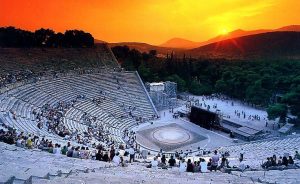

 What do you get if you cross cutting edge research in the ancient world with creative talent?
What do you get if you cross cutting edge research in the ancient world with creative talent? The Research Centre for Greek and Latin Literature of the Academy of Athens is delighted to invite you to the 6th online lecture of its 2020-2021 Seminar ([Self-]Praise & [Self]-Blame in Ancient Literature).
The Research Centre for Greek and Latin Literature of the Academy of Athens is delighted to invite you to the 6th online lecture of its 2020-2021 Seminar ([Self-]Praise & [Self]-Blame in Ancient Literature).
 Thank you so much for this – it’s great for us to be back for a little while, albeit virtually. All three of us share the same passion: our enthusiasm for Roman inscriptions, especially inscriptions composed in verse. To us, those inscriptions are not just stones or pieces of metal that happen to have some poetry inscribed on them. They are carriers of art. They are visible, tangible manifestations of a universal artistic practice of Roman times, spanning the empire across time and space, with thousands of examples surviving to the present day.
Thank you so much for this – it’s great for us to be back for a little while, albeit virtually. All three of us share the same passion: our enthusiasm for Roman inscriptions, especially inscriptions composed in verse. To us, those inscriptions are not just stones or pieces of metal that happen to have some poetry inscribed on them. They are carriers of art. They are visible, tangible manifestations of a universal artistic practice of Roman times, spanning the empire across time and space, with thousands of examples surviving to the present day.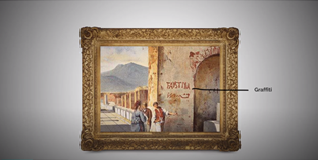

 We wanted to make a number of strong, important points. About the way in which we perceive, in which we encounter the Roman world. About the way the ancient world is presented to us in museums, archives, exhibitions, and books. And we want to do so while racing a wide audience because what we have to say and offer is relevant to so many different audiences.
We wanted to make a number of strong, important points. About the way in which we perceive, in which we encounter the Roman world. About the way the ancient world is presented to us in museums, archives, exhibitions, and books. And we want to do so while racing a wide audience because what we have to say and offer is relevant to so many different audiences. We want to enthuse new generations with our passion for Roman history, for poetry, for epigraphy. We want to give teachers the opportunity to expand the canon of teaching through the inclusion of poetry that students can easily relate to. We want to invite museums, collections, and policymakers to rethink their approach to the way in which these incredibly exciting, talking objects from the ancient world are displayed. What better way to achieve this than to choose a text that expresses, in such beautiful words, the grief of pet owners – whose faithful companion had died. We feel we all can relate to that, and we feel that this text alone opens up so many new ways of thinking about the Roman world and the people who “were” the Romans, than the ever-same repertoire of classical authors.
We want to enthuse new generations with our passion for Roman history, for poetry, for epigraphy. We want to give teachers the opportunity to expand the canon of teaching through the inclusion of poetry that students can easily relate to. We want to invite museums, collections, and policymakers to rethink their approach to the way in which these incredibly exciting, talking objects from the ancient world are displayed. What better way to achieve this than to choose a text that expresses, in such beautiful words, the grief of pet owners – whose faithful companion had died. We feel we all can relate to that, and we feel that this text alone opens up so many new ways of thinking about the Roman world and the people who “were” the Romans, than the ever-same repertoire of classical authors.
 Haha, oh dear! Well… none of us are natural-born entertainers. We all were terrified and at first, we hated to see our faces and hear our recorded voices. But
Haha, oh dear! Well… none of us are natural-born entertainers. We all were terrified and at first, we hated to see our faces and hear our recorded voices. But  We hope that putting this video out there will make it available for generations to come – for pupils, teachers, academics, cultural managers, policy makers: it should entertain and be useful at the same time! It’s genuinely a piece of art.
We hope that putting this video out there will make it available for generations to come – for pupils, teachers, academics, cultural managers, policy makers: it should entertain and be useful at the same time! It’s genuinely a piece of art.
